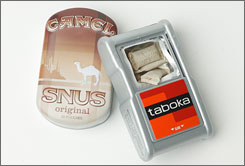How dissolvable tobacco products are made could determine whether or not they fall under the jurisdiction of the Food and Drug Administration.
Star Scientific Inc., a maker of dissolvable tobacco lozenges, announced Wednesday that it received an FDA notice saying that two of its products are not subject to regulations in the federal Food Drug & Cosmetic Act.
The determination could open the door for other dissolvable tobacco products, such as R.J. Reynolds Tobacco Co.’s Camel orbs, sticks and filmlike strips for the tongue, to also not be subject to FDA regulation.
The industry, led by Reynolds, has put more focus on smokeless tobacco as a revenue source in recent years as the number of U.S. adults who smoke has dropped to about 20 percent.
According to the federal act, smokeless tobacco is defined as “any tobacco product that consists of cut, ground, powdered or leaf tobacco, and that is intended to be placed in the oral or nasal cavity.”
The Star products are Ariva-BDL and Stonewall-BDL — the acronym stands for “below detectable levels” of certain cancer-causing chemicals in tobacco, particularly when it is burned as part of smoking. Star has sold a different version of Ariva and Stonewell for years.
Star declined to discuss its proprietary manufacturing process. Some analysts said its process may involve tobacco being compacted or compressed, rather than made into powder — evidentially enough of a distinction to not qualify as smokeless tobacco.
“It’s a head scratcher how the FDA made its determination since we applied for the products to be considered as a modified-risk tobacco product,” said Sara Machir, a spokeswoman for Star.
Star said that the notice came from a statement by Dr. Lawrence Deyton, the director of the FDA’s Center for Tobacco Products. Deyton said he based the decision on the information submitted by Star.
The FDA verified Deyton’s statement that “not all tobacco products are currently subject” to the act. At this time, only cigarettes, cigarette tobacco, smokeless tobacco and roll-your-own tobacco are subject.
Jeffery Ventura, a spokesman for the FDA, said that the agency “recognizes there are uncertainties regarding the regulatory status of a variety of nicotine-containing products derived from tobacco; more specifically, whether these products are regulated as drugs or tobacco products.
“The FDA is considering its legal and regulatory options regarding these products.”
With the notices in hand, Star said it will proceed with the marketing and selling of the BDL versions of Ariva and Stonewell. Machir said it could take two months for the products to reach retail shelves.
“These initiatives will be undertaken consistent with our belief that adult tobacco users should be able to have information about the toxin levels in all tobacco products,” said Paul Perito, the chairman, president and chief operating officer of Star.
Star continues to pursue FDA approval for a moist-snuff product that it said has the lowest levels of carcinogens — in this case nitrosamines — in the marketplace. That includes “99 percent lower than the levels found in conventional American moist snuffs, such as Copenhagen or Skoal, and 90 percent less than the level found in current snus products,” the company said.
David Howard, a spokesman for Reynolds, said that according to company policy, “communications with the FDA regarding specific products is confidential.”
Bill Godshall, the executive director of SmokeFree Pennsylvania, is an outspoken advocate for smokeless tobacco as a reduced-risk alternative to cigarettes. He said he is curious about how the FDA made its determination.
“Does this mean that some/many/most/all other dissolvable-tobacco products also aren’t smokeless tobacco?” he asked. “It also appears Star can now claim its Ariva BDL and Stonewall BDL are less-hazardous alternatives to cigarettes.
“Maybe Reynolds will also have to apply for modified-risk status for their dissolvables to find out.”
Scott Ballin, the past chairman of the Coalition on Smoking or Health, said that the FDA’s decision “is indicative to me that people are beginning to realize that not all tobacco-containing products are the same.”
“I have said for more like two years that the current statute is outdated and we need to be looking at a better, fairer regulatory system that regulates the most toxic products more stringently than the lower risk ones.”
 RSS Feed
RSS Feed Twitter
Twitter 11:15 AM
11:15 AM
 Alexis
Alexis



0 comments:
Post a Comment